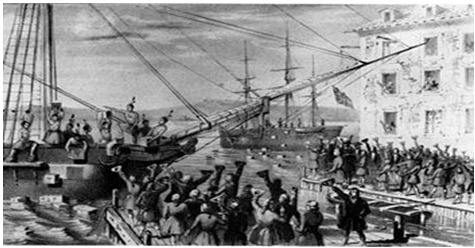
Doctrine of Lapse
From Trade to Territory of Class 8
- Lord Dalhousie; the Governor-General from 1848 to 1856 introduced Doctrine of Lapse. This policy refuted the customary adoption of a son and stated that a dependent state would pass into British hands in the absence of a natural-born heir. Satara (1848), Sambalpur (1850), Udaipur (1852), Nagpur (1853), and Jhansi (1854) were all annexed under this policy only.
- In 1856, the Company also took over Awadh. They said they were "obliged by duty" to take over Awadh in order to free the people from the "misgovernment" of the Nawab.
SETTING UP A NEW ADMINISTRATION
British territories were broadly divided into administrative units called Presidencies. There were three Presidencies: Bengal, Madras, and Bombay. Each was ruled by a Governor. The supreme head of the administration in India was the Governor-General. Warren Hastings, the first Governor-General, introduced several administrative reforms notably in the sphere of justice.
JUDICIARY
- In 1772 a new system of justice was established. Each district was to have two courts - a criminal court (faujdari Adalat) and a civil court (Diwani Adalat). Maulvis and Hindu pandits interpreted Indian laws for the European district collectors who presided over civil courts. The criminal courts were still under a qazi and a mufti but under the supervision of the collectors.
- In 1775 eleven pandits were asked to compile a digest of Hindu laws. N.B. Halhed translated this digest into English. By 1778 a code of Muslim laws was also compiled for the benefit of European judges. Under the Regulating Act of 1773, a new Supreme Court was established, while a court of appeal - the Sadar Nizamat Adalat - was also set up at Calcutta.
- The principal figure in an Indian district was the Collector. His main job was to collect revenue and taxes and maintain law and order in his district with the help of judges, police officers, and darogas. His office - the Collectorate - became the new center of power.
THE COMPANY ARMY
- The power of Colonial rule in India rested on its military strength.
- In the eighteenth century, the Company began recruitment for its own army. It started recruiting peasants into armies and trained them as professional soldiers. This came to be known as the sepoy army.
- As warfare technology changed from the 1820s, the cavalry requirements of the Company's army declined. The soldiers of the Company's army had to keep pace with changing military requirements and its infantry regiments now became more important.
- In the early nineteenth century the British began to develop a uniform military culture. Soldiers were increasingly subjected to European-style training, drill and discipline that regulated their life far more than before. Often this created problems since caste and community feelings were ignored in building a force of professional soldiers.

CONCLUSION
The East India Company was transformed from a trading company to territorial colonial power. By 1857 the Company came to exercise direct rule over about 63 percent of the Indian territory and 78 percent of the population of the Indian subcontinent. Combined with its indirect influence on the remaining territory and population of the country, the whole of India was under its control.







